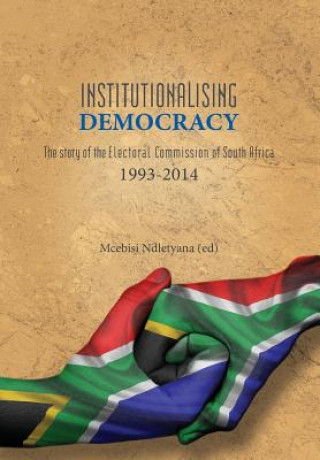
Kód: 01026441
Institutionalising Democracy. The story of the Electoral Commission of South Africa
Autor McEbisi Ndletyana
South Africa is now more than twenty years old as a democratic republic. Five successful elections have been amongst the major markers of the country's democratic status. The success of the elections has, in turn, yielded stable i ... celý popis
- Jazyk:
 Angličtina
Angličtina - Vazba: Brožovaná
- Počet stran: 278
Nakladatelství: Africa Institute of South Africa, 2015
- Více informací o knize

Mohlo by se vám také líbit
Informovat o naskladnění knihy
Zadejte do formuláře e-mailovou adresu a jakmile knihu naskladníme, zašleme vám o tom zprávu. Pohlídáme vše za vás.
Více informací o knize Institutionalising Democracy. The story of the Electoral Commission of South Africa
 Anotace knihy
Anotace knihy
South Africa is now more than twenty years old as a democratic republic. Five successful elections have been amongst the major markers of the country's democratic status. The success of the elections has, in turn, yielded stable institutions of governance. Because they were elected through a credible electoral process, the various spheres of government enjoy popular legitimacy. Pivotal in moulding these institutions of governance has been the Independent Electoral Commission (IEC). The first of its kind, this book provides a detailed analysis of how the IEC has made South Africa one of the stable democracies in the world, and subsequently rose to enjoy international prominence. More important than the Commission's achievements, the book focuses our attention on how institutions are formed and evolve. The formation of both the interim and permanent Commissions, in 1993 and 1997 respectively, was a product of South Africa's own history, culture and national sensitivities. Their subsequent evolution, beyond the character of the leadership and internal dynamics, was strongly shaped by the general vibrancy of South African democracy. Amongst the many lessons that this book shares is that public institutions are not established by a mere promulgation of the law. Their full character is realised in the course of life, shaped through sharp contestations by the various actors, who are often-time driven by sectional interests. What one institution becomes ultimately is as much a reflection of the strength of others as it is an outcome of internal dynamics. Public institutions are complementary. And, though they're founded on rules, individuals are similarly important in moulding their character. Institutions hardly have a life of their own, but are imbued such life by those who inhabit them. An equally important lesson that the book stresses is that the Constitution, however noble its intentions, does not necessarily confer rights. Rights are gained by citizens through active mobilisation. The extent to which a society is conscious and enjoys the entire spectrum of its rights depends on the level of activism on the part of its citizenry. On-going activism ensures continued vibrancy of public institutions and enjoyment of rights. This unique book, in other words, is not only a narrative of how institutions are formed and evolve, but also of how democracy remains vibrant.
 Parametry knihy
Parametry knihy
Zařazení knihy Knihy v angličtině Society & social sciences Politics & government Political structure & processes
- Plný název: Institutionalising Democracy. The story of the Electoral Commission of South Africa
- Podnázev: 1993-2014
- Autor: McEbisi Ndletyana
- Jazyk:
 Angličtina
Angličtina - Vazba: Brožovaná
- Počet stran: 278
- EAN: 9780798304818
- ISBN: 9780798304818
- ID: 01026441
- Nakladatelství: Africa Institute of South Africa
- Hmotnost: 484 g
- Rozměry: 171 × 244 × 19 mm
- Datum vydání: 01. December 2015
Oblíbené z jiného soudku
-

Democracy in America
139 Kč -

The Prince
89 Kč -

Republic and The Laws
223 Kč -

CONVERSATIONS WITH MYSELF
520 Kč -

Stalin
569 Kč -

Anarchy, State, and Utopia
503 Kč -

Prince
223 Kč -

The Prince
135 Kč -

Weapons of Math Destruction
323 Kč -

Prince
223 Kč -

How the World Works
463 Kč -

Prince
356 Kč -

JFK and the Unspeakable
463 Kč -

The Road to Unfreedom
254 Kč -

Red Notice: How I Become Putins No 1 Enemy
323 Kč -

Twilight of Democracy
302 Kč -

From Dictatorship to Democracy
223 Kč -

Signal and the Noise
476 Kč -

Audacity of Hope
302 Kč -

Social Origins of Dictatorship and Democracy
713 Kč -

State in the Third Millennium
1057 Kč -

How to Stand Up to a Dictator
302 Kč -

Oxford IB Diploma Programme: Authoritarian States Course Companion
1239 Kč -

Democracy in America
340 Kč -

Prince
196 Kč -

Theory U: Leading from the Future as It Emerges
1046 Kč -

How Democracy Ends
290 Kč -

World As It Is
302 Kč -

Democracy Incorporated
597 Kč -

Red State, Blue State, Rich State, Poor State
674 Kč -

Tyranny of Merit
302 Kč -

Utopia
143 Kč -

Stalin, Vol. I
517 Kč -

Concise Oxford Dictionary of Politics and International Relations
383 Kč -

Future of Freedom
495 Kč -

Book of Lord Shang
1001 Kč -

Winter Is Coming
323 Kč -

Republic
223 Kč -

Orban
511 Kč -

Likewar: The Weaponization of Social Media
377 Kč -

Obama: An Intimate Portrait
1121 Kč -

Prince
342 Kč -

How to Run a Country
364 Kč -

Road to Somewhere
276 Kč -

Hitler
542 Kč -

Democracy for Realists
500 Kč -

Mrs. Kennedy and Me
400 Kč -

Oxford Handbook of Comparative Constitutional Law
1565 Kč -

Prince
433 Kč
Osobní odběr Praha, Brno a 12903 dalších
Copyright ©2008-24 nejlevnejsi-knihy.cz Všechna práva vyhrazenaSoukromíCookies





 Vrácení do měsíce
Vrácení do měsíce 571 999 099 (8-15.30h)
571 999 099 (8-15.30h)